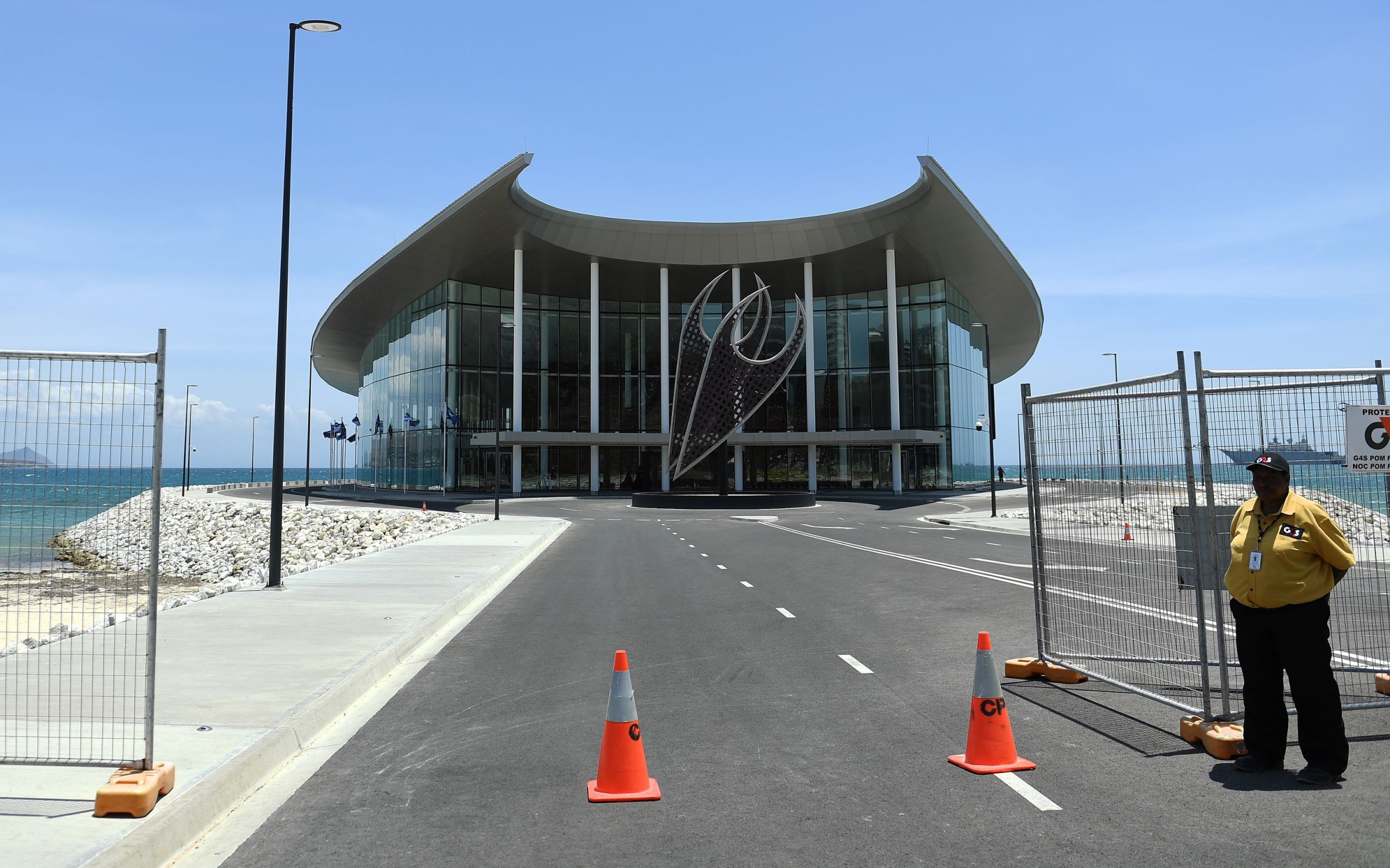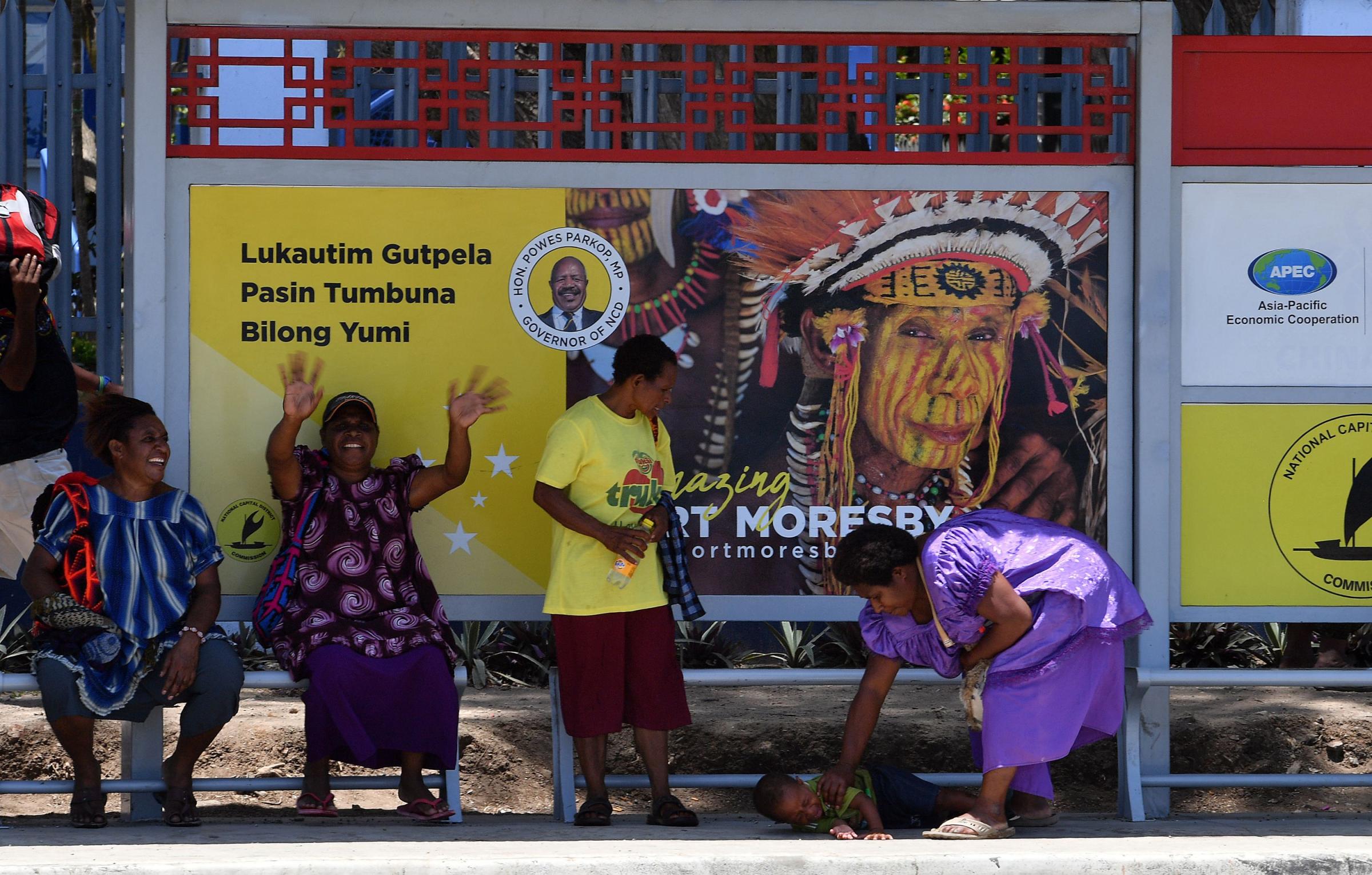
The Pacific island nation of Papua New Guinea (PNG) boasts some of the highest crime, worst health metrics and foulest corruption on the planet. But its low-rise capital, Port Moresby, is also welcoming luxury cars and cruise liners this week as some world’s most powerful men and women arrive for the annual Asia-Pacific Economic Cooperation (APEC) summit.
The meeting is arguably the biggest thing to happen to the former Australian colony since independence in 1975, and spotlights the growing importance of South Pacific nations in the strategic tussle between China on the one hand and Washington’s regional allies, like Australia and Japan, on the other.
China has pledged some $5.9 billion on more than 200 projects in the region since 2011, according to Australian think tank the Lowy Institute, and the fact that President Xi Jinping is attending the summit, when both the leaders of the U.S. and Russia opted to stay way, demonstrates the region’s significance to Beijing’s thinking.
Last week, Australian Prime Minister Scott Morrison unveiled $1.45 billion in grants and loans to strengthen ties with the region, which he said should be “front and center” of Australian foreign policy, in an apparent bid to head-off Beijing’s influence. And not surprisingly. PNG’s proximity to Australia — four kilometers at its closest point — explains why Canberra’s anxiety over Beijing’s growing clout.
Although Australia still remains the largest overall donor in the South Pacific, China is wooing Port Morseby hard. China’s foreign minister Wang Yi told reporters during a visit to Port Morseby last month that his government was “committed to friendship” with PNG, and in June Prime Minister Peter O’Neill of PNG inked a deal to accept loans and aid under China’s transnational trade and infrastructure network, the Belt and Road Initiative. Beijing has also provided $50 million for the renovation of PNG’s International Conference Center and the building of a grand boulevard connecting it to Parliament House.
“PNG is experiencing the traditional rivalry between the West and the East,” says Teddy Winn, head of political science at the University of Papua New Guinea.
The covetous eyes being cast over PNG might seem curious given that it is by far the weakest of the 21 APEC economies, with a per capita GDP of just $2,745 in 2015, according to the IMF. But PNG has vast swathes of timber, and huge mineral, oil and gas deposits, which a resource-hungry China is looking to exploit. Its population of 8 million — speaking 800 distinct languages and spread out across some 600 islands — is also almost twice that of New Zealand, making it the second largest Pacific nation, and on current population projections will be the size of Australia by 2050.
“It’s the big player and has a position of leadership in the South Pacific,” says Shane McLoud, a Pacific Islands expert for the Lowy Institute. “That’s particularly important for Beijing given six South Pacific nations still officially recognize Taipei.”
The jostling for dominance in PNG — from the Australian Air Force F/A-18F jets swooping overhead, and U.S. Navy vessels patrolling offshore, to the newly sealed roads and bus stops adorned with “China Aid” signs — is evident to all APEC delegates.
But whether this buttering up will translate to quality of life improvements of PNG’s people is an open question. Some 80% of the population lives in far-flung villages without access to electricity, running water or healthcare. The nation has some of the world’s highest rates of tuberculosis, while malaria is also a serious blight, and polio — officially eradicated in 2000 — is making a worrying comeback after more than 20 confirmed recent cases.
Carjackings and serious crime are meanwhile rife, courtesy of tribal rivalries and street gangs dubbed “raskols.” Most expats have little choice but to live behind high walls in gated communities patrolled by guards. That a U.S. diplomat was robbed at a police checkpoint for his watch, cash and cellphone last year spotlights why high-profile delegates will travel by armored car through ramshackle Port Moresby, ranked the world’s fifth worst city to live in by the Economist Intelligence Unit.

‘It’s very insulting when we face such serious problems’
PNG expected to be awash with money at this point. Back in 2013, when this year’s summit was awarded to Port Moresby, the country was expecting to hit double-digit growth, and experienced significant strides in infrastructure, thanks to a $19 billion Exon-Mobile natural gas project in the Southern Highlands. But PNG has long been hostage to global commodity prices, which have tanked in the years since. The result is rising inflation and a simmering foreign reserve crisis — not helped by the reported $300 million cost of hosting the APEC summit.
The APEC Haus convention center, inspired by the double-hulled design of local boats but looking for all the world like a giant horned beetle arising from the waters of Walter Bay, was built as a national showpiece. But away from its soaring glass walls and specially commissioned artworks, PNG schoolchildren often sit on classroom floors for want of desks, hospitals lack basic supplies, and social programs go unfunded.
“The government has been focused on APEC a lot and it hasn’t really addressed those issues adequately,” says academic and former journalist Geejay Milli.
What should have been a polished debut on the world stage has thus become a somewhat fraught event where three cruise-liners have been brought in to house the 7,000-odd participants due to a lack of hotel rooms. The U.S. is being represented by Vice-President Mike Pence but he has decided against staying in PNG itself, instead jetting in from neighboring Australia.
Unlike Pence, Xi will be staying in PNG, at the newly constructed Stanley Hotel. Its grounds feature a small Chinese pagoda instead of the typical local spirit house — just one of many signs of Beijing’s swelling influence. Anxiety over the Chinese presence is a constant local refrain. Complaints over Chinese mining projects, which mostly use imported Chinese labor and appear to provide little benefit to local people, are common. There are also worries that the opaqueness of deals with Beijing will only worsen government graft in a country ranked 135 out of 180 nations on Transparency International’s corruption perception index.
“Chinese loans tend to be no strings attached, as opposed to aid by Western donors, like the E.U., Australia or the U.S. which have very stringent criteria for how the government will utilize it,” says Winn.
The hosting of APEC has itself been hit by graft allegations, owing to the 40 Maseratis and three Bentleys purchased at a cost of $7 million to ferry titans of business and politics past Port Moresby’s shacks of corrugated iron and plastic tarps. After APEC, they will be auctioned off to the few locals who can afford them — a plan that prompted thousands to strike in protest last month.
“It’s just a cheap way for politicians and their cronies to get their hands on luxury cars,” says prominent local blogger Martyn Namorong. “It’s very insulting when are facing such serious social problems.”
Although many local people are understandably excited to be in the world spotlight, the question is whether the influx of business and political leaders will lead to enough new investment to justify the huge costs of hosting the APEC summit.
“Investors make their choices dependent on favorable conditions and opportunities, not because an event like APEC is held in the country,” says Namorong.
Adds one civil society leader, who maintains that the money should have been spent alleviating poverty: “We maintain that people have died directly because of the hosting of APEC.”
More Must-Reads from TIME
- Cybersecurity Experts Are Sounding the Alarm on DOGE
- Meet the 2025 Women of the Year
- The Harsh Truth About Disability Inclusion
- Why Do More Young Adults Have Cancer?
- Colman Domingo Leads With Radical Love
- How to Get Better at Doing Things Alone
- Michelle Zauner Stares Down the Darkness
Write to Charlie Campbell / Port Moresby at charlie.campbell@time.com